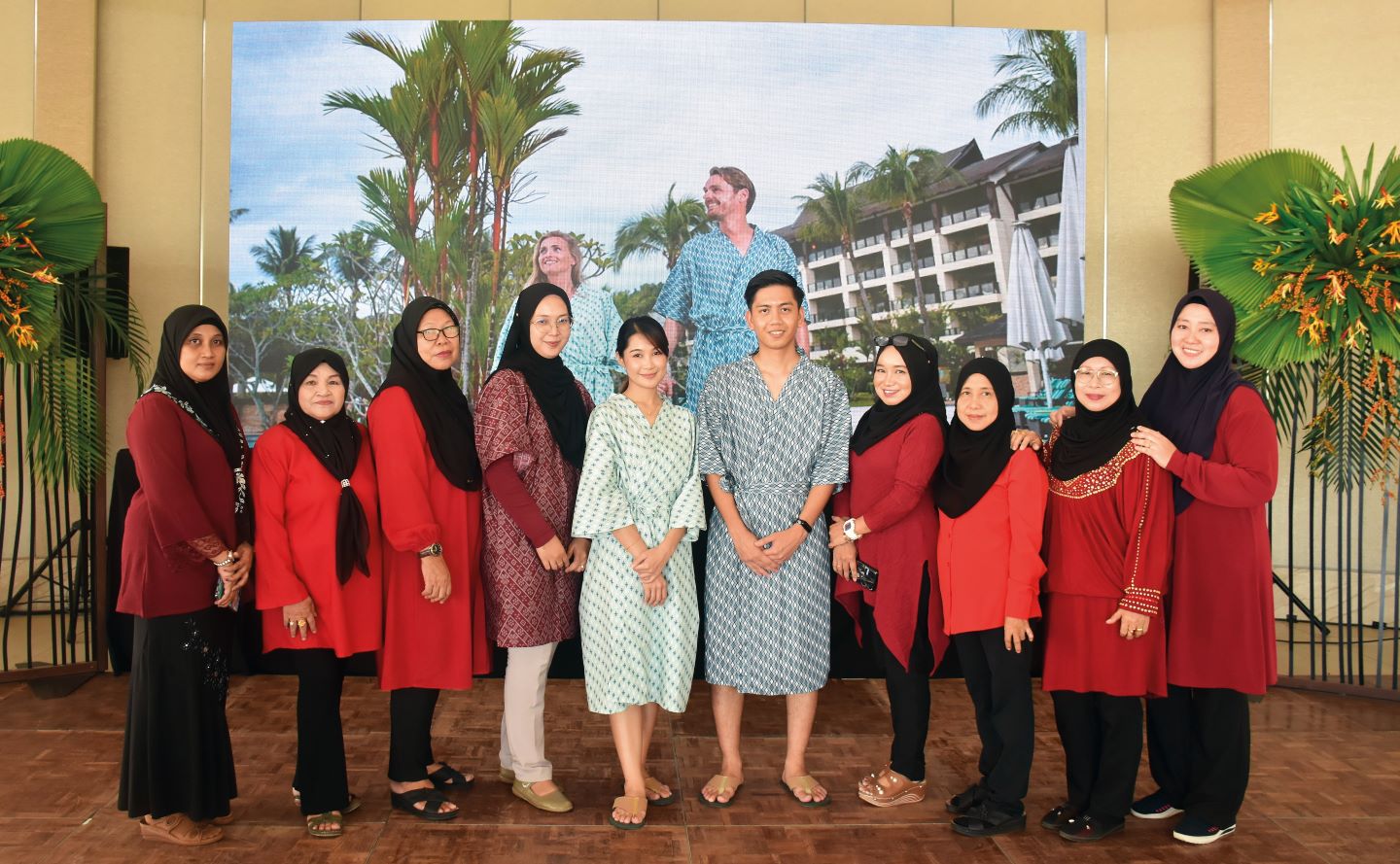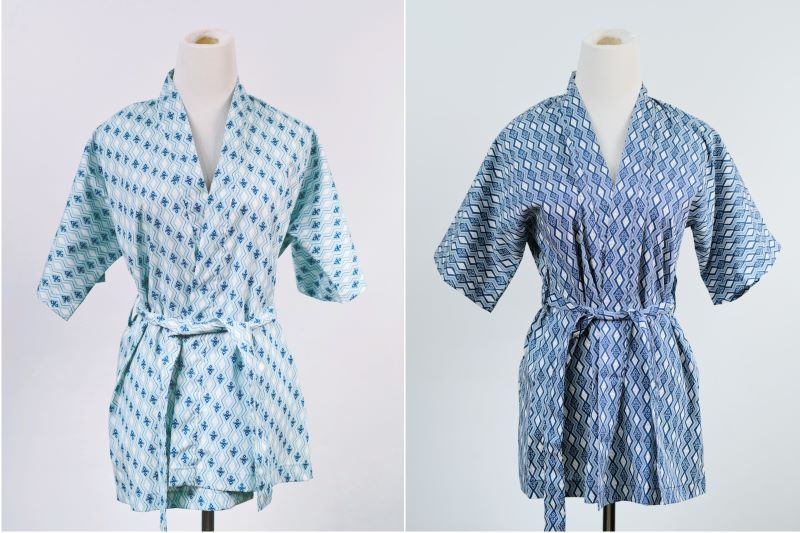
Most of the artisans working on the project are stay-at-home mothers, aunts or grandmothers (All photos: Shangri-La Rasa Ria/Changgih Designs)
When one arrives at a hotel, there are certain pre-conceived expectations of its service and products. It is a notion Shangri-La Rasa Ria general manager Fiona Hagan and her team completely understand and hence were always looking for ways to improve and provide exquisite experiences for their customers, especially after the pandemic.
“For the past three years, the team and I have gone through some turbulent times. We sat down to reflect on our core values which comprise community, nature and adventure. When we talk about nature, we have the 64-acre Rasa Ria Reserve and a 3km beach. In terms of adventure, we offer many recreational activities to guests. But the thing that is really close to hearts is the sense of community,” she says.
Hagan wanted to incorporate a meaningful touch into Rasa Ria’s suites and rooms with a product that has a story and connection to the locals. She extended the resort’s collaboration with Sabah-based social enterprise Changgih Designs — which had worked with Rasa Ria on two other projects, producing drawstring bags made of recycled linen from the hotel and giving Batik Canting training to the guests — to come up with a new offering that would benefit the property as well as the people of Tuaran. The team duly agreed on a kimono robe.
“We want to focus on products of excellent quality that are produced in Sabah. As we want to provide exceptional experiences to our guests, it is important that we work with partners who share our values,” she says.
sarimpak.jpg

Hagan insisted that for the initiative to be successful, they needed to talk to the locals. “You don’t speak to me, the general manager who came from a country many miles away. You speak to the people who live here, who are proud to share their personal stories about their family and traditions.”
Changgih Designs co-founder Bethany Dawson jumped into action by reaching out to friends and artisans through WhatsApp, but was not able to find anyone who wanted to get on board for the project. Then she visited villages around Tuaran to try her luck there. “We went to several kedai runcit in the area. The locals were a bit shocked to see us and said they could not speak English. I told them, ‘Tidak apa. Saya nak tanya ada penjahit kah di kampung ini?’”
After making a couple of rounds in Tuaran, she was finally led to a seamstress, Yasnie Vedia. Dawson explained the collaboration with Shangri-La Rasa Ria and asked whether she knew people who might be interested in the job. “I thought there was no way on earth Yasnie would say yes to that. But she told me she would ask around.”
Yasnie was initially sceptical. “Kita fikir dia orang asing yang sesat. Tapi dia beritahu tentang projek dia dengan Rasa Ria. Kami minta tengok jenis kain yang dia guna dan dia guna cotton, senang untuk jahit. Dia tunjuk robe itu. Dia cakap kita hanya tinggal jahit sahaja, kain semua akan digunting siap-siap.” During the meeting, Dawson also talked to Yasnie about the pay the seamstresses would get and it was “lumayan untuk tukang jahit kampung macam kita ni”.
After hearing more about the plan, Yasnie felt confident that Dawson was not a “scammer”. The latter had explained her mission to help mothers and housewives in the area, in addition to promoting their culture by incorporating designs inspired by it. The artisans were especially excited at the thought of being able to help their husbands who had been financially affected by the pandemic. Most of them are stay-at-home mothers, aunts or grandmothers who wish to contribute to their household income while still looking after the children and elderly.
sewing.jpg

“Mereka mahu tolong suami tapi tidak boleh keluar bekerja sebab kena jaga anak di rumah. Pendapatan sebagai tukang jahit juga teruk masa Covid. Tiada orang mahu tempah baju untuk perayaan,” says Yasnie.
And so, the seamstresses began working on the project by attending workshops hosted at Rasa Ria for about a week, with design and production managers from Changgih leading the training. In total, the programme took an accumulative 1,519 hours to complete, from selecting the fabrics and handcrafting the designs to tailoring the robe, which is available for in-room use by guests — adults and children — staying in the suites and family rooms of Rasa Ria.
Suzilawatie, one of the artisans, shares about the knowledge she gained and how her life has improved after participating in the project. “Saya sudah menguasai empat design baju. Sambil belajar, saya juga dapat income saya sendiri. Biasanya, di rumah, kita buat kerja suri rumah macam pergi pasar, jaga anak-anak dan tunggu duit dari husband. Tapi, enam bulan kita bersama Changgih, pendapatan kita setanding dengan orang lain yang keluar bekerja.”
The idea for the design of the Sarimpak robe came from Dawson, who professes a profound interest in culture. “My family and I often travel and we stay in various villages for a few days to gauge their cultural activities. I constantly take photos of motifs I find interesting.”
As she was looking for inspiration to come up with a pattern that would be exclusive to Rasa Ria, she chanced upon headgear worn by the Bajau Samah community as part of their ceremonial costume. A symbolic representation of the tribe’s traditions and customs, the ornament, shaped like the horns of a water buffalo, is traditionally worn by the Bajau bride during weddings.
shangri-la_rasa_ria.jpg

“We would find the oldest person in the village to ask them the meaning of the object. Then I cross-checked with five other people to ensure the meaning that I got was consistent.” Armed with a background in maths and the arts, Dawson did some sketches and played around with shapes on paper until she came up with a design that “looks fun, and hopefully other people will think it looks nice”.
As Rasa Ria places great emphasis on sustainability and the quality of its products and services, she made sure to source the fabrics from ethical clothing manufacturers. “We were looking for an all-in factory that could do everything, from spinning the cotton into thread and weaving it into fabric to printing the material and shipping it to us.” They found one in the US. Knowing the factory they work with very well is important to assure customers about the quality and origin of the fabric.
Hagan saw this Sarimpak robe project as a golden opportunity to play their part in introducing the city beyond the quintessential tourist spots. “When they come to Sabah and stay with us, we want them to talk about not what just happened in Mount Kinabalu or Kinabalu Park. We want to introduce them to local businesses and destinations, which will encourage the economy and open up opportunities,” says the general manager.
“As the Sarimpak robe project unfolded, we were delighted to witness the incredible talent and dedication of the Tuaran artisans. We are proud that this initiative not only supports sustainable practices but also strengthens our ties with the community in a meaningful way, as many of our colleagues come from this part of the city.”
This article first appeared on July 24, 2023 in The Edge Malaysia.


